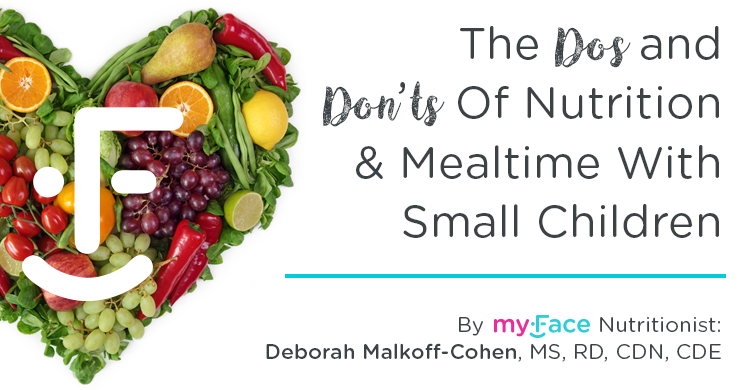By myFace Nutritionist, Deborah Malkoff-Cohen MS, RD, CDN, CDE
Establishing healthy eating habits and proper nutrition in your children is essential from a very young age, as these will impact their overall health and relationship with food for their entire lives. A well-balanced diet is vital for your child to develop both physically and cognitively, and what you teach your children about healthy eating habits can affect their body image in the future.
Here are a few of my favorite tips when dealing with food battles.
DO
- Have family meals where your children eat their meals seated at a table with the rest of the family as often as you can.
- Modify your child’s meal so their portion sizes are smaller and age-appropriate; ensure there is nothing that can be easily choked on.
- Offer a meat, carb and a vegetable or fruit for all meals (Mac/cheese is not a well-balanced meal, serve alongside some chicken, fish, beef, etc. and cheddar broccoli). For breakfast, an example would be to serve oatmeal with a string cheese and some sliced banana.
- Always send your kiddos to school with a protein-filled breakfast to help keep them full until lunch. Think eggs, oatmeal, peanut butter toast, grilled cheese, etc. A carb-filled breakfast (cereal, waffles, pancakes, bagel with cream cheese) digests rapidly and can leave their bellies growling quicker, this can distract from learning.
- Taste all food before serving it to your kids to make sure it’s delicious!
- Serve a new food along with old favorites and have other family members model eating the new food in front of your child (this helps with introducing new food to picky eaters!)
- Have your child try new foods when they are hungry.
- Establish regular snack times throughout the day.
- Start teaching kids about nutrition, food selection, and basic food preparation from a young age.
- Keep variety in your child’s meals.
- Talk to a doctor about any specific health concerns.
- Make sure your child is getting enough zinc, calcium, and iron as these are the nutrients most children don’t get the daily recommended values of.
- If your child is dealing with weight issues, focus on behavior-changes (not weight changes.)
- BE PATIENT, most kids are neophobic with new foods (scared to try something new).
- Be a good role model for your kids (Monkey-see, monkey-do). Your kiddos won’t want to eat carrots if you’re eating pretzels in front of them.
DON’T
- Feed your child in front of the TV, iPad or any electronics. Kids tend to overeat when distracted.
- Allow them to graze throughout the day on chips and other unhealthy snacks that have no nutrition.
- Use food as a reward (“If you eat all your food I’ll give you cookies, etc.”).
- Force your child to clean their plate.
- Get upset by messes — your child is learning fine motor skills and accidents will happen, however, they should be minimal by the time your child is in grade school.
- Force your child to eat certain foods (this will have a negative impact on their desire for that food).
- Serve too many foods high in fat and sugar.
- Pass your food hang-ups on your kids, offer all foods without judgment.
- Provide your child with the same foods for each meal, this will only reinforce a few foods and not facilitate expanding their variety.
I have been working with a family where both parents are health conscious and one goal they had early on was for their kiddos to like vegetables (every parent’s wish, right?!). They key is to introduce early on, we decided on a “green vegetable juice” at around 8 months old via a straw cup. A typical recipe might be celery, spinach, cucumber, apple and lemon. To this day their family and friends are shocked when their kids, now ages 5 and 8 eat SALAD with their dinner!!! They key is to start as early as you can, be consistent and you’ll see lifelong healthy eating habits.








